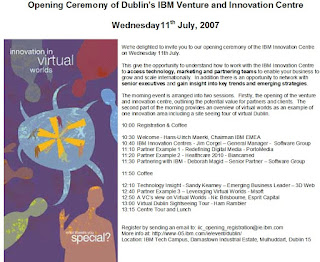Daniel attended this recent IBM event and is sharing his notes here:

As was
previously announced by the former future leader of the main party in government and minister for Enterprise IBM have this past week opened what they describe as an
Innovation Centre. It is very nice facility in part of building 6
I missed the introduction from Hans Ulrich Maerkl, Chairman of IBM EMEA as I had some other matters to attend to.
I came in just as the talk from
Jim Corgel was hitting its stride it was primarily aimed at Venture Capitalists and companies that are thinking of partnering with IBM and he spoke of the ongoing roll out of Innovation centres or similar type facilities around Europe and he also spoke of the types of virtual supports that there will be.
Next up, we saw a video from
Porto Media which was quite twee (as the owner himself admitted but the idea is very good - essentially you can download media such as movies in less than 20 secs to a USB stick from a Kiosk that can be placed anywhere. The kiosk takes up a sq metre of floor space and compared to say Blockbuster which has 8/900 moives per store, this device can have 4/5,000 movies. After the video we heard from the company’s owner Chris Armstrong who spoke about the problems of being taken seriously by the Venture Capital community in Ireland.
Next was
BiancaMed, who are in the medical devices area. This may perhaps be more interesting from an wider
IDC perspective. They is involved in proactive, non invasive monitoring of sleep, diet and exercise as part of its efforts in enhancing well-being. (I know it sounds a little too like a line from Lenina Husley in Demolition Man- " Enhance your calm, John Spartan") That said, I'd be curious about the technology, they use audio that gets analysed to monitor heart rate breathing and so on.
Next, Deborah Magid from IBM then spoke more about what IBM gives for Partner organisations. This presentation was a bit more buzzwordy. I'm pretty sure I heard synergy being used at least once. That said, IBM are really pushing that they are interested in partnering with companies and that they are interested in VCs funding some of those companies.
We broke for coffee at this point and there was some mingling.
Sandra Kearney - spoke at length about Web 2.0 and how Internet 3D is what IBM believes is the next stage in the web. She uses it herself to manage her teams who are distributed across Australia, the US and SE Asia. A ex-military person and pilot with 1500 hours flight time, I recall she mentioned 130s so I'm guess it was C130s.
Msoft spoke about how they use 2nd life for demoing what their product is all about. Their product is for tracking blood product in a hospital/clinical environment.
Nic Brisbourne spoke again about the VC environment and the opportunities involved. Only tangential about virtual worlds and 3D internet. If you click the link on his name you can read his perspective on the opening.
Ham Rambler or John Mahon (who is a pilot) spoke about Dublin in 2nd Life which he created and how that has been going. Talked about audio streaming and live music being played within 2nd life and how money can be made by the players of the music.
Then we had lunch - sandwiches on the go - and a tour of the new area. I spoke with Alexander Troussov about their work on Galaxy, it is quite intriguing and also the Lotus Connections work is interesting. Overall there was a pretty heavy business emphasis to the day and a considerable media in attendance. There were well over 200 people in all.
